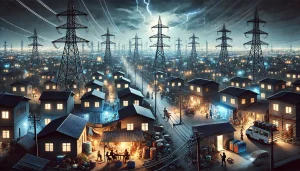Small Business Owners Reject Proposed Electricity Tariff Hike
By Ricky Awodi
LAGOS — Small business owners and civil society organisations have strongly opposed the Federal Government’s proposed electricity tariff hike, arguing that it lacks justification and will cripple the already struggling business sector.
This comes as the Minister of Power, Chief Adebayo Adelabu, disclosed that the government is considering raising tariffs for customers outside the Band-A category to improve liquidity in the Nigerian Electricity Supply Industry (NESI).
Power Sector in Financial Distress
Speaking at the public presentation of the National Integrated Electricity Policy (NIEP) and Nigeria Integrated Resource Plan (NIRP) in Abuja, Adelabu stated that the government can no longer sustain the N3 trillion power sector subsidy, as debts owed to power generation companies (GenCos) have climbed to N4 trillion.
“The key issue in the market is illiquidity, and sector reforms will continue to focus on that,” he said. “We will look at the tariff again. I’m not saying we’re going to increase it, but we will assess how to improve our modest achievements from last year.”
Adelabu noted that customers in Band-B, who receive about 18 hours of electricity daily and pay N63/kWh, create a problematic gap compared to Band-A customers. The government’s new policies aim to attract investment and strengthen the national power grid, which currently forces 60% of Nigerian manufacturers into self-generation.
Massive Investment Required
Government projections indicate that achieving stable electricity supply will require about $29.23 billion in investments by 2035, with total sector investments expected to reach $122 billion by 2045. The NIEP and NIRP documents outline a phased approach to eliminating power shortages and reducing reliance on self-generation.
In support of Nigeria’s electricity sector, the UK government has provided £200 million through the UK Nigeria Infrastructure Advisory Facility (UKNAIF). Sally Woolhouse, Head of Economic Development at the Foreign, Commonwealth & Development Office (FCDO), reaffirmed the UK’s commitment to strengthening Nigeria’s power industry.
Small Businesses at Risk
Despite these long-term plans, small business owners argue that any immediate tariff increase will be devastating. Dr. Femi Egbesola, President of the Association of Small Business Owners of Nigeria (ASBON), warned that higher electricity costs would inflate production expenses, reduce sales, and ultimately force many micro and small enterprises out of business.

“Most SMEs rely on government-supplied electricity. Any further tariff hike will lead to inflation, lower sales due to high production costs, and could ultimately result in the collapse of vulnerable businesses,” Egbesola stated.
With small businesses serving as the backbone of Nigeria’s economy, stakeholders insist that any tariff review must be carefully assessed to avoid worsening the economic hardship facing millions of Nigerians.
Small Business Owners Reject Proposed Electricity Tariff Hike


